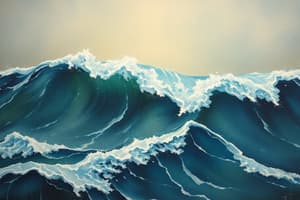Podcast
Questions and Answers
What is compression in a wave?
What is compression in a wave?
- Part of the wave where the wavelength goes down and the frequency goes up (correct)
- Part of the wave where the wavelength goes up and the frequency goes down
- A wave that travels perpendicular to the direction of propagation
- Length of one compression to another
What is rarefaction in a wave?
What is rarefaction in a wave?
- Length of one compression to another
- Part of the wave where the wavelength goes down and the frequency goes up
- A wave that travels parallel to the direction of propagation
- Part of the wave where the wavelength goes up and the frequency goes down (correct)
What is the definition of wavelength?
What is the definition of wavelength?
Length of one compression to another
A longitudinal wave travels perpendicular to the direction of propagation.
A longitudinal wave travels perpendicular to the direction of propagation.
What is a longitudinal wave?
What is a longitudinal wave?
Flashcards are hidden until you start studying
Study Notes
Key Concepts of Longitudinal Waves
- Compression: Region in a longitudinal wave where particles are close together; results in decreased wavelength and increased frequency.
- Rarefraction: Region in a longitudinal wave where particles are spread apart; leads to increased wavelength and decreased frequency.
- Wavelength: The distance between two consecutive compressions; essential for understanding wave properties.
- Longitudinal Wave: A type of wave that propagates parallel to its direction of travel; differs from transverse waves where motion is perpendicular.
Studying That Suits You
Use AI to generate personalized quizzes and flashcards to suit your learning preferences.




